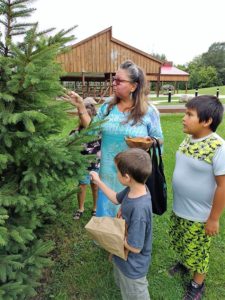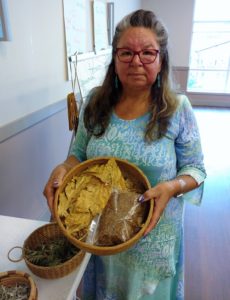Aamjiwnaang youth learn traditional medicines from knowledge keeper

By Colin Graf
AAMJIWNAANG FIRST NATION—Children attending a summer camp got a healthy dose of cultural learning about traditional medicines thanks to knowledge keeper and cultural educator, Liz Akiwenzie.
Akiwenzie of Neyaashiinigmiing First Nation (Chippewas of Nawash Unceded First Nation) spoke to the youth about the roles of men and women in Indigenous traditions and ceremonies, and then helped them collect plants in Bear Park, behind Maawn Doosh Gumig Community and Youth Centre.
Akiwenzie explained to the children that one of the roles men hold in the community is to be firekeepers, while the women are the waterkeepers. She added that the boys will need to learn how to make a fire with flint and striker. Akiwenzie told the group that the roles of fire and water illustrate how relationships should work in daily life.
“We have to be mindful about balancing our fire and our water,” she explained. “The fire burns everything if it becomes too big, but women’s water can put out that fire too.”
She taught the children about the four traditional medicines, tobacco, sage, sweetgrass, and cedar. They learned that tobacco is for praying and should be held in the left hand, as it is closest to the heart. In ceremony, Akiwenzie taught them that tobacco always goes first, and that sage is a women’s medicine—good for bringing calm and clearing hearts and minds when used in smudging. Akiwenzie explained how sweetgrass represents kindness, and cedar can be used as a cold remedy.

According to community health and wellness worker in Aamjiwnaang, Roberta Bressette, the session is meant to help promote greater awareness of traditional teachings among the young students.
The hope is that young people will learn and utilize “the medicines that are all around us” and use them “on a more regular basis,” said community health representative Elizabeth Cronk.
“We’re finding individuals to help teach us how to use things that are on the land that might help us…gaining that knowledge back that was lost,” she says, explaining that teaching these ideas to children is both a cultural and health initiative.
Akiwenzie naturally gravitates towards the children during their snack break and shows them the traditional medicines as well as salves she has made from various plants and bear grease.
“We need to plant the seeds with the young ones—they are the ones who are going to pick this up, who will be the next leaders. They are brilliant human beings, they are the ones who are closer to the Creator, closer to the Earth than we [adults] are,” says Akiwenzie, a traditional healer who travels five days a week, sharing her knowledge across Ontario from east to Sudbury and through the southwest and into the Detroit area.
Following their snacks, the kids open their paper bags and get ready to gather plant medicines outside. Akiwenzie instructs them to remember to pick medicine with their left hands, and place the plants they pick “nice and gentle on the ground and tell the medicine how you will use it to help people.”
Even a short walk through the mowed powwow grounds of the park turn up medicinal and edible plants that go quickly into the bags—dandelion, good in salads and for making a healthy tea, and plantain, a help with bee stings. Soon they find purple clover growing in the grass and their teacher tells them it can be turned into an antibiotic.
As the kids approach the edge of the neighbouring bush area, Akiwenzie shows them evergreen needles to boil in the autumn for making cough syrup to treat the coming winter’s illnesses.
The teacher says she gained her knowledge quietly from her parents and older people in younger days, in spite of efforts to prevent them by abusive priests and nuns at the day school she was forced to attend.
“We weren’t allowed to know about this when we were children,” she shares, recalling the physical, mental, emotional, sexual, spiritual abuse.
Akiwenzie is clear why she wants to spend so much of her time with children.
“I want the world to be a better place for the next generations.”


